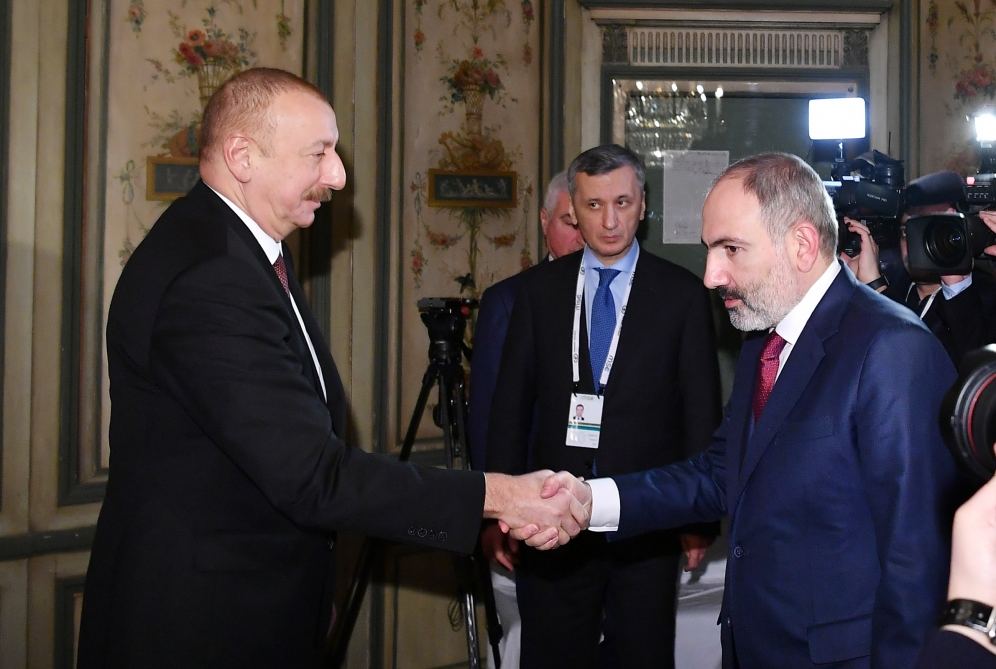BAKU, Azerbaijan, Dec. 14
Trend:
A meeting between President of Azerbaijan Ilham Aliyev and Prime Minister of Armenia Nikol Pashinyan will take place within the framework of the upcoming summit of the Eastern Partnership countries in Brussels on December 15.
The Azerbaijani side is always open to political dialogue and welcomes such contacts. The position of Azerbaijan, considering the realities of the post-Karabakh conflict period, has been repeatedly voiced by the head of state and on international platforms. In this context, the Brussels Summit and the meeting to be held within its framework will create additional opportunities.
According to former US Ambassador to Azerbaijan Matthew Bryza, one of the important issues to be resolved within the framework of negotiations between President Ilham Aliyev and Prime Minister Nikol Pashinyan in Brussels is border demarcation between Azerbaijan and Armenia.
“It is so important to define that border, because until that happens, I think we’re going to see continuing clashes between Armenia and Azerbaijani soldiers along an ambiguous border, which will lead to a loss of life and instability. Yes, Russian President Vladimir Putin has now taken a role to help the two sides define their border. I wish this was a joint commitment by the entire OSCE Minsk Group and may be in the end, it will be, because I think a very important role for the Minsk Group is to help define that international border,” he said.
According to Bryza, Russia, the US and France should be working together to stabilize the situation.
“I also look forward to the upcoming meeting now in Brussels that will involve EU mediation and at the end of the day, I think it is important that the EU plays some role perhaps instead of France in the mediation process. Because the EU brings so much more diplomatic weight to the negotiating table, meaning all of its members rather than just a membership of France, especially France that has previously, in fact, on November 10, 2020 clearly expressed its support for Armenia,” Bryza said.
Meanwhile, according to Doctor of Historical Sciences, Professor of the Department of International Relations in the Post-Soviet Space of St. Petersburg State University Niyazi Niyazov, Pashinyan will most likely try to somehow neutralize the agreements that were reached in Sochi with the mediation of Russian President Vladimir Putin and will try to use the experience and sympathy of the European Union to bring the discussions of the existing interstate problems between Armenia and Azerbaijan to the international level.
“Today, the Armenian leadership is trying its best to reanimate the OSCE Minsk Group. From this point of view, it really needs the EU's support. Probably, some humanitarian issues will be discussed, perhaps the parties will undertake obligations related to resolving issues in this area,” Niyazov said.
In his opinion, the Armenian side will try the agreements that were reached earlier, if not torpedo, then at least slow down.
“But the Armenian doesn’t have a lot of choices here. It is either to meet the wishes of the leading countries, to actively participate in the "3+3" process, to achieve the opening of communications, to get out of geo-economic isolation, to start developing as a normal state. Or, submitting to the revanchist demands, to engage in new confrontation with Azerbaijan. But taking into account the realities that exist today, this path will be completely disastrous for the Armenian side, the Armenian statehood. As we have seen, 30 years of such a policy ultimately did not lead to anything good in Armenia,” the professor said.
“The economic and political situation in Armenia is difficult, the geo-economic and geopolitical situation for the country also remains extremely difficult. And therefore, years of confrontation, if all communications are not opened, will be a disastrous scenario for the development of events for Armenia,” he added.
Niyazov also noted that lasting peace in the region can be established after, as repeatedly stated by the Azerbaijani political leadership, delimitation and demarcation of the state border between Azerbaijan and Armenia takes place.
Any efforts aimed at normalizing Armenian-Azerbaijani relations are welcomed. It is important to ensure the continuation of regular contacts between the leaders of Azerbaijan and Armenia, and it is expected that following the meeting of the leaders of the two states, which is scheduled for December 15 in Brussels, the commitment to the implementation of the trilateral agreements will be reaffirmed.






